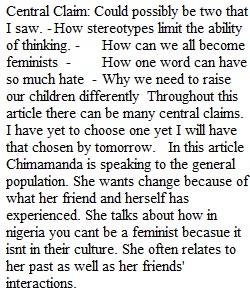


Q Brainstorming Guidance In order to write any kind of draft, you need to do some focused thinking and brainstorming. Use the following steps to help get you started, thinking of this as what Murray refers to as a "zero draft" or what Lamott calls a "shitty first draft." It is intended to help lay some groundwork for something to be rethought, revised, and developed--to be written and rewritten through the recursive process of writing. It is NOT intended to be written eloquently or in fully-formed ideas. You need a starting place, and this is it. The questions below are suggested questions to help get you thinking and writing. Feel free to answer as many as you'd like--feel free not to answer any but to generate your zero draft on your own. (Just keep in mind that what follows reflects the expectations of the assignment, so at some point in your writing process you'll want to answer the questions provided here.) Your Text Choice: • What text have you selected from the options on the Assignment Sheet? • Why? What is it about this text that appealed to you or that you thought would be useful for this assignment? Your Reading Reactions: • Whether you have formally annotated the text or not, how would you describe your reactions to the text? What kinds of observations did you make? What parts or aspects of the text stood out to you the most? Why? Which parts did you care less for than others? Why? Was this like anything you've read before? Did anything about its content and/or form stand out to you? Why? Add anything else here that seems relevant or potentially useful to your brainstorming. Your Textual Analysis: • Use this space to make note of any and all of your analysis. Include analysis of the text's "writing situation" (its context, purpose, genre, and intended audience--and the way these factors seem to have shaped or influenced the text in any way). • Also include analysis of the text's content--its subject matter, its information or ideas (whether presented directly in a non-literary text or presented indirectly in a literary text). • Lastly, include analysis of the text's form--the "how" of the text--how it was crafted. o For a non-literary text, think about the use of rhetorical appeals (ethos, pathos, and logos) but also about all other kinds of rhetorical features, such as the use of questions, direct address, diction and syntax, organizational structure or form, illustrative examples, personal examples, anecdotes, repetition, etc. o For a literary text, think about the use of literary devices, such as figurative language (metaphors, similes, and the like), imagery, language, diction and syntax, plot structure, characterization and character development, setting, point of view, rhyme, stage directions, dialogue, etc. (depending on genre). • What thoughts--however preliminary--do you have about an interpretation of the text? (an original claim you could make about the text as a whole [not just a part or aspect of it]). If you feel lost here right now, think and write a little bit about why or what is out of reach right now--what's confusing you or what do you feel unsure of? Yourself as a Source: • Remember that you want to avoid overly "easy" or "convenient" connections between yourself and the text you've chosen. • With that in mind, what ideas, if any at this early stage, do you have about moments or things from your personal life that might help give you insight into how you're interpreting the text? Formatting and Assessment This Zero Draft does NOT need to be in draft or paragraph form; it CAN be, but it could also be less formally structured. If your Zero Draft illustrates real thought and effort into tackling the essay assignment, you'll receive full credit. (That is, a brief bulleted list likely won't cut it--what you present should reflect time spent on the text and the assignment). You will not lose points for formatting (i.e., no need to worry or ask about how to format this). In addition to the regular requirements for homework assignments to earn credit, your draft will earn credit EVEN if it: • o isn't yet structured or organized in a particular or logical way o isn't yet consistently focused from start to finish--you may wander and that's ok as long as you're writing o isn't yet written in your strongest prose o isn't yet fully developed If you are used to writing only one draft before submitting your work for a grade and/or are more comfortable getting it all down the first time around, you are welcome to write as much as you'd like for this zero draft, BUT I strongly encourage you to free yourself from feeling that this zero draft needs to be "complete," let alone "perfect." Take advantage of the process itself. PreviousNext
View Related Questions